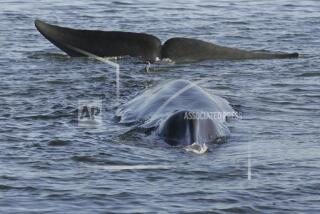Canada, EU Reach Agreement on Fishing in North Atlantic
- Share via
BRUSSELS — In a compromise that could lead to important new conservation measures, Canada and the European Union agreed Sunday to end their bitter dispute over the rights to catch dwindling fish stocks in the North Atlantic.
Following emergency negotiations that culminated in an Easter morning initialing ceremony, the two sides agreed on a series of quota-monitoring measures, including a commitment to launch a pilot project that would place international observers on some ships fishing in the area and track others by satellite.
At a news conference here, EU Commissioner for Fisheries Emma Bonino said the compromise accord will be submitted next month to the Northwest Atlantic Fisheries Organization, which sets the commercial fishing quotas.
“The deal we have agreed to is a new and concrete step toward a better joint conservation policy,” she said.
At the heart of the dispute were Canadian accusations that Spanish trawlers are ignoring internationally set quotas and dangerously overfishing the area.
Canada was motivated in part by high unemployment within its own fishing fleet but also by the need to enforce mandated conservation measures.
“Our objective was not to get a bigger slice of the pie,” Canadian Fisheries and Oceans Minister Brian Tobin said in Ottawa. “Our objective was to ensure there was a pie.”
Although the accusations were not new, the dispute erupted into a full-scale diplomatic incident March 9 when Canadian patrol boats seized the Spanish trawler Estai and impounded its catch, even though it was fishing in international waters.
Canada defended its action by claiming that fish in the disputed zone swim in and out of Canadian waters. Spain, with EU backing, accused Canada of running roughshod over international law and threatened economic sanctions.
Sunday’s agreement, which came after several EU member states leaned heavily on a reluctant Spanish government to accept it, allows the European fleet an additional catch of slightly more than 5,000 tons for the rest of the year and a larger percentage of the 1996 quota.
Spain and Portugal are the only European countries whose fleets fish for the disputed Greenland halibut, also known as turbot, and Spanish negotiators had pressed for a larger share of the 1995 quota.
Still, to gain agreement on the conservation measures, Canada gave ground in several other areas.
For example, the EU’s percentage of the 1996 halibut quota was increased from 12% to more than 40% of the total 27,000 tons. Canada also agreed to drop all charges pending against the crew of the Estai and to return the impounded catch.
More to Read
Sign up for Essential California
The most important California stories and recommendations in your inbox every morning.
You may occasionally receive promotional content from the Los Angeles Times.













